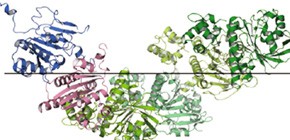
New protein complex playing major role in genome stability identified
Under the leadership of Professor Akira SHINOHARA and Professor Atsushi NAKAGAWA , Institute for Protein Research, Osaka University, a group of researchers identified a new protein complex involved in genome stability and clarified the role of the complex in meiosis and meiotic recombination.
It is crucial for DNA, the blueprint for life, to maintain genomic sequence information correctly. Failure in correct inheritance of DNA during cell division may cause cancer. Likewise, failure in correct inheritance of DNA in reproductive cells may cause genetic diseases or miscarriage.
DNA rearrangements may occur during genetic recombination and the causes of such are various. However, it's possible for DNA damage to be repaired. Recombination associated with DNA strand exchange can write back information lost by damage.
Rad51 plays a major role in homologous recombination of DNA during double strand break repair. However, Rad51 filament formation creates changes in the genome, so it is regulated by a variety of proteins.
This group discovered new protein complex consisting of 4 proteins: Psy3, Csm2, Shu1, and Shu2 (PCSS). Past research has clarified that these four proteins are involved in repairing DNA damage. This group's research confirmed that these four proteins form a stable complex with Psy3 and Csm2 placed in the center and demonstrated that they were necessary for Rad51 filament formation in cells. This group demonstrated Psy3-Csm2 dimer promoted Rad51 filament formation and stabilization of the end of the Rad51 filament played an important role in genome stability.
PCSS plays a role similar to that of breast cancer susceptibility genes. Therefore, the development of drugs strengthening PCSS functions shows promise of leading to the development of drugs for cancers caused by failures in recombination, such as hereditary breast cancer.
Abstract
Homologous recombination, an exchange of two DNA duplexes, plays a critical role in genome stability by repairing DNA damage induced by exogenous and endogenous threats such as ionizing radiation and oxidative stress. Dysfunction of genome stability leads to cancer. The importance of the recombination to prevent cancer is seen in patients with familiar breast cancers with a mutation in the Brca2 (Breast cancer type 2) gene. Brca2 works in the recombination with Rad51, which plays a central role in the recognition of homology between the two DNA molecules in the recombination. During homologous recombination, eukaryotic RecA homolog Rad51 assembles into a nucleoprotein filament on single-stranded DNA to catalyze homologous pairing and DNA strand-exchange. In this study, we identify a new protein complex, the PCSS complex, which promotes Rad51-assembly by mimicking Rad51-structure and works with Brca2. We propose the mutation in PCSS may increase a risk for cancers in human.

Figure 1

Figure 2
To learn more about this research, please read the full research report entitled " A new protein complex promoting the assembly of Rad51 filaments " at this page of the Nature Communications website.
Related links :
